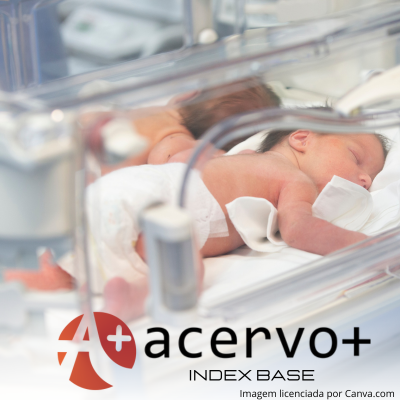Consequências no desenvolvimento neuropsicomotor de recém-nascidos internados em Unidades de Terapia Intensiva neonatal
##plugins.themes.bootstrap3.article.main##
Resumo
Objetivo: Avaliar a associação entre consequências no desenvolvimento neuropsicomotor de acordo com o tempo de permanência e procedimentos realizados em neonatos nas Unidades de Terapia Intensiva Neonatal. Métodos: Trata-se de uma revisão sistemática, tendo como público-alvo neonatos que foram admitidos em Unidade de Terapia Intensiva Neonatal (UTIN). As buscas foram feitas em 3 bases de dados (BVS, Pubmed e Cochrane Library) a partir de descritores: neonatos, UTIN e desenvolvimento neuropsicomotor. Os artigos encontrados foram filtrados pelo Software Rayyan e avaliação da sua qualidade metodológica foi feita pela Newcastle-Ottawa Scale (NOS). Resultados: Foram identificados 8049 artigos, dos quais 23 foram considerados elegíveis para a íntegra avaliação, sendo que 11 desses foram incluídos na revisão. Verificou-se que neonatos internados com baixo peso ao nascer e/ou baixa idade gestacional, com morbidades e sujeitos a procedimentos cirúrgicos apresentaram maiores riscos de comprometimento no neurodesenvolvimento. Considerações finais: Os estudos demonstraram que recém-nascidos sujeitos a períodos de internação em UTIN podem ter consequências no seu desenvolvimento neuropsicomotor.
##plugins.themes.bootstrap3.article.details##
Copyright © | Todos os direitos reservados.
A revista detém os direitos autorais exclusivos de publicação deste artigo nos termos da lei 9610/98.
Reprodução parcial
É livre o uso de partes do texto, figuras e questionário do artigo, sendo obrigatória a citação dos autores e revista.
Reprodução total
É expressamente proibida, devendo ser autorizada pela revista.
Referências
2. BARROS R, et al. Principais instrumentos para avaliação do desenvolvimento neuropsicomotor em crianças no brasil. Brazilian Journal of Development, 2020; 6(8): 60393–60406.
3. BEMBICH S, et al. Preterm Newborn Adaptive Responses to Daily Nursing during Neonatal Intensive Care Unit Stay, Associate with Neurodevelopment, 2 Years Later. American journal of perinatology, 2023; 40(13): 1454–1460.
4. BOLISETTY S, et al. Neurodevelopmental outcomes of extremely preterm infants in New South Wales and the Australian Capital Territory. Journal of paediatrics and child health, 2019; 55(8): 956-961.
5. CHO H, et al. Head growth during neonatal intensive care unit stay is related to the neurodevelopmental outcomes of preterm small for gestational age infants. Pediatrics & Neonatology, 2021; 62(6): 606-611.
6. CHUNG E, et al. Neurodevelopmental outcomes of preterm infants: a recent literature review. Translational Pediatrics, 2020; 9(1): 3.
7. CONG X, et al. The impact of cumulative pain/stress on neurobehavioral development of preterm infants in the NICU. Early Human Development, 2017; 108: 9–16.
8. COSTA I, et al. Impacto das Telas no Desenvolvimento Neuropsicomotor Infantil: uma revisão narrativa / Impact of Screens on Child Neuropsychomotor Development: a narrative review. Brazilian Journal of Health Review, 2021; 4(5): 21060–21071.
9. KLINGENBERG C, et al. Growth and neurodevelopment in very preterm infants receiving a high enteral volume-feeding regimen–a population-based cohort study. The Journal of Maternal-Fetal & Neonatal Medicine, 2019; 32(10): 1664-1672.
10. KRATIMENOSA P, et al. Association between hemoglobin concentrations at discharge from the neonatal intensive care unit with markers of neurodevelopmental outcomes in premature neonates. Journal of Neonatal-Perinatal Medicine, 2019; 12(2): 221-230.
11. KYRIAKIDOU M, et al. Neurodevelopmental Outcome in Extremely Low Birth Weight Infants at 2–3 Years of Age. Medicina, 2020; 56(12): 649.
12. MCGOWAN E, et al. Analysis of neonatal neurobehavior and developmental outcomes among preterm infants. JAMA Network Open, 2022; 5(7): 2222249.
13. PASCAL A, et al. Neurodevelopmental outcomes of very preterm and very-low-birthweight infants in a population-based clinical cohort with a definite perinatal treatment policy. European Journal of Paediatric Neurology, 2020; 28: 133-141.
14. PATRA K e GREENE M. Health care utilization after NICU discharge and neurodevelopmental outcome in the first 2 years of life in preterm infants. American journal of perinatology, 2018; 35(5): 441-447.
15. STROUSTRUP A, et al. Sources of Clinically Significant Neonatal Intensive Care Unit Phthalate Exposure. Journal of exposure science & environmental epidemiology, 2020; 30(1): 137.
16. SUNG S, et al. The impact of surgical intervention on neurodevelopmental outcomes in very low birth weight infants: a nationwide cohort study in Korea. Journal of Korean medical science, 2019; 34(43).
17. VAN D, et al. Neonatal stress, health, and development in preterms: A systematic review. Pediatrics, 2021; 148(4): 2021050414.
18. VLIEGENTHART R, et al. Duration of mechanical ventilation and neurodevelopment in preterm infants. Archives of Disease in Childhood-Fetal and Neonatal Edition, 2019; 104(6): 631-635.
19. YUE S, et al. Impact of Neonatal Intensive Care Unit (NICU) Environmental Stress on Neurodevelopment in Preterm Infants and Advances in Epigenetic Research. Chinese Journal of Contemporary Pediatrics, 2019; 21(11).
20. ZHAOA T, et al. Early-life factors associated with neurobehavioral outcomes in preterm infants during NICU hospitalization. Pediatric Research, 2022; 92(6): 1695-1704.

